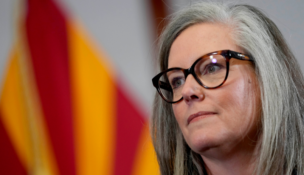Sex-based ID measure gets committee OK from Republicans
Jakob Thorington Arizona Capitol Times//January 23, 2025//
Sex-based ID measure gets committee OK from Republicans
Jakob Thorington Arizona Capitol Times//January 23, 2025//
A House panel blocked an attempt from Democratic lawmakers to expand non-discrimination protections to include sexual orientation, gender identity and gender expression.
The issue was raised during a House Government Committee hearing Jan. 22. The committee passed HB2062 on party lines, which would define sex-based terms such as “male,” “female,” “man,” and “woman,” in Arizona law.
The bill’s sponsor, Rep. Lisa Fink, R-Peoria, said the measure is also intended to protect single-sex spaces including bathrooms and women’s sports.
“This bill was carefully drafted to ensure it does not create any special rights for women, nor does it take away any rights from others,” Fink said.
Many Democrats and LGBTQ advocates disagree with Fink’s assessment of the bill, titled the “Arizona Sex-based Terms Act.”
During a press conference before the bill was heard in committee, Rep. Betty Villegas, D-Tucson, announced her intention to introduce an amendment to Fink’s bill that would instead expand non-discrimination protections for LGBTQ individuals in housing and public accommodations and services.
“It is long past time to correct this glaring injustice,” Villegas said. “Discrimination and inequity have no place in Arizona.”
Republicans on the committee voted against moving Villegas’s amendment and proceeded with Fink’s bill, coming just days after President Donald Trump signed an executive order prohibiting federal agencies from funding, promoting or communicating statements related to “gender ideology.”
Several LGBTQ activists attended the hearing to express their opposition to the measure, including Ruth Carter, an attorney based in Phoenix who identifies as nonbinary.
Carter told the committee that they weren’t sure what sex they would have to choose if Fink’s bill became law. The Arizona Motor Vehicle Division currently allows people to select “X” on their driver’s licenses and IDs if they identify as nonbinary.
Another group of people Cater said they were concerned for are people born intersex, or individuals born with reproductive anatomy that doesn’t fit into a binary sex classification.
The National Institute of Health estimates about one in 5,000 people are born with “ambiguous” genitalia.
“Think of nonbinary people like people with green eyes. We are rare, but we are real,” Carter said.
Republicans in the Legislature have tried numerous times in the past few years to pass laws aimed at replacing definitions of gender in administrative code and statute with definitions of biological sex. Gov. Katie Hobbs has vetoed all attempts.
The advocacy group Independent Women’s Voice applauded Fink’s bill and called on Hobbs to sign the measure after the governor vetoed a similar bill in 2024.
Hobbs wrote in her veto letter of the 2024 bill: “As I have said time and again, I will not sign legislation that attacks Arizonans.”
Fink said her bill is not intended to “erase” anyone and supporters of the bill say the measure protects women’s rights and women’s safety in public spaces like bathrooms and locker rooms.
“There are people that use this, men, that use this as a loophole to go into women’s spaces and assault them,” said Rep. Rachel Keshel, D-Tucson. “We need to keep those girls safe. This bill has nothing to do with gender identity and everything to do with sex.”
The measure would also require the state’s political subdivisions, including public school districts, to collect sex-related statistics to identify people as either male or female. Fink noted her bill still allows the Legislature to create laws protecting specific groups of people in certain contexts, leaving the door open for the Legislature to pass legislation that enhances protections for LGBTQ individuals like Villegas proposed Jan. 22.
“Rep. Lisa Fink’s legislation to define ‘woman’ so women’s rights aren’t erased is so important,” said Independent Women’s Voice’s Legislative Liaison Paula Scanlan in a news release. Scanlan was a collegiate swimmer who shared a locke rroom with transgender swimmer Lia Thomas.
“Hopefully, after the election mandate of 2024, bipartisan passage of similar legislation in Congress, and executive action by President Trump, the Legislature can pass this bill quickly, and Gov. Hobbs can make the right choice this year. 2025 is the year for women’s rights in Arizona to be protected,” Scanlan said.
It’s unlikely that Hobbs will sign the bill given her history on the issue. Villegas said she was glad the bill would need to go through Hobbs after Republicans shot down her amendment.
In 2023, Rep. Lorena Austin, D-Mesa, announced she identifies as nonbinary. Rep. Stephanie Stahl Hamilton, D-Tucson, said during the Jan. 22 House Government Committee hearing that she was disappointed to see another attempt from Republicans on this issue because she believes it negates the experience of their colleague.
Rep. Patty Contreras, D-Phoenix, said she probably would consider herself nonbinary if she was younger in today’s world based on her preferences for activities and clothes that have traditionally been designated for boys and men.
“Here we are again. Instead of spending time to work on issues, such as housing affordability, education and water, we are again wasting time to define sex,” Contreras said.
“Our own member that every time that we try to bring this up and we try to justify our stances, we denigrate them and it’s one more attempt at trying to remove them from their experience,” Stahl Hamilton said.
The Government Committee’s chairman Rep. Walt Blackman, R-Snowflake, said he holds deep respect for Austin and wants her story to be told on the House floor. He said moving the bill out of the committee would open the discussion for other members and learn about Austin’s experience.
“Committee rooms and committees are engaged to get the conversation started and to move the conversation forward,” Blackman said. “I expect to hear conversation on the floor so everyone can speak on this bill.
House Minority Leader Oscar De Los Santos, D-Laveen, is also sponsoring legislation that would include explicit protections for sexual orientation and gender identity with HB2364.

















